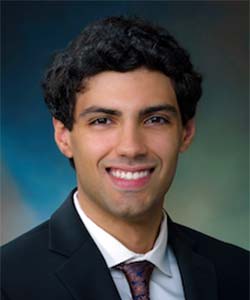The ASRA Pain Medicine Mentor Match Program: Nationally Awarded and Locally Realized
Cite as: Shah S, Butt A. The ASRA Pain Medicine Mentor Match Program: nationally awarded and locally realized. ASRA Pain Medicine News 2024;49. https://doi.org/10.52211/asra110124.013.
The American Association of Medical Society Executives has awarded ASRA Pain Medicine's Mentor Match Program the National Academies of Medical Societies Program of the Year. As a senior faculty physician, I've navigated the complexities of a medical career for decades. I've witnessed mentorship's profound impact on young physicians' trajectory along the way. Having a guiding hand can make all the difference in a field where the stakes are high, and the learning curve is steep.
A mentoring program provides invaluable support for career physicians by offering them a safe space to voice their concerns, seek advice, and share experiences. Medicine isn't just about clinical expertise; it's about navigating ethical dilemmas, managing burnout, and finding work-life balance. Mentors can offer insights born from experience, helping their mentees navigate these challenges with wisdom and empathy.
Imagine the enriching experience of mentoring a first-year resident from a different institution, offering fresh perspectives and diverse insights. Through ASRA Pain Medicine's Mentor Match's innovative approach, you'll have the chance to connect with someone who brings a unique set of experiences and challenges, broadening your understanding of the medical landscape. By bridging institutions, Mentor Match creates a dynamic environment for learning, collaboration, and professional growth that transcends traditional boundaries. Here I share the perspective of my mentee, resident intern Ahmed Butt, MD, who is participating in the Mentor Match program just as he is starting his career!
“I initially applied for the mentorship program when I was a fresh PGY 1 to get more experience in pain medicine. I asked for a mentor outside of my program and region to gain a different perspective and better understand the landscape in pain medicine. At the time, I was also exploring different areas in pain medicine like pediatric pain medicine. The mentorship program gave me an opportunity to be matched with an attending who had expertise in that specific area. Dr. Shah also helped me realize that fellowship can be a means to broaden your practice, not necessarily limit it to one sub-specialty.
The further I have gone in my residency training for anesthesiology, the more I realize that there are differences in the amount of experience you get with certain skills (transplants, epidurals, regional blocks, etc.) depending on your program. While looking at fellowships, it's difficult to know right away what skills are strong and weak and which of those skills will translate into practice. It was helpful to be able to find out more from my mentor about what exactly to look for in fellowship programs, such as experience with pain pumps and nerve stimulators.
Another topic of interest in my career advising was the type of practice that would work for me and how to set that up in my future. It is hard to know how the market looks – if people can find jobs and if those jobs pay them what they expect to be paid. Another aspect of this is how often new attendings choose to go into private practice versus employment. Additionally, figuring out how often they decided to start their own practice was tough and whether the risk was worth it in the current or previous markets.
Having a mentor not only gives me the opportunity to have her look over my work and assess where I am in the process but also to have a person to talk to who has gone through this process and understands how certain choices will affect the type of career I have.
Ultimately, a mentoring program isn't just about shaping individual careers; it's about nurturing a supportive community that values collaboration, continuous learning, and compassionate care. In an ever-evolving field like medicine, this sense of camaraderie and guidance is essential for both personal fulfillment and professional success.”

